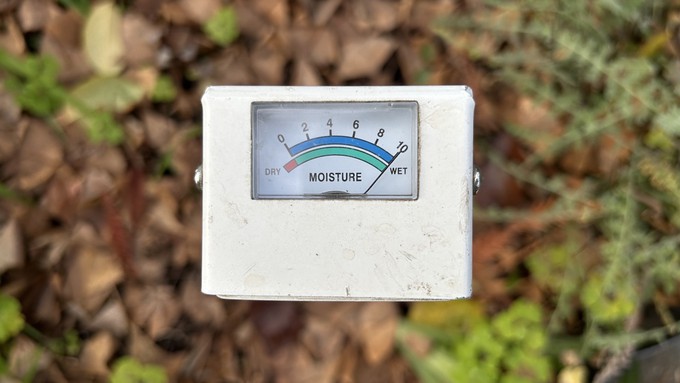
Downtown has received more than 18 inches so far in 2024 -- with more on the way

A moisture meter is an essential tool for the Sacramento-area gardener. Makes a great gift, too! Kathy Morrison
Will 2024 be remembered as a wet or dry year? (Hint: Look outside.)
Although we’ll certainly remember the heat (with more than 50 days in triple digits), 2024 saw above-average rainfall – and we’re not done yet.
According to the National Weather Service, Downtown Sacramento has totaled 18.03 inches through Dec. 17 – more than 1.5 inches above average for those 50 weeks.
February (4.63 inches), April (1.60), November (3.53) and December (2.27 and counting) all tracked above average and other months (such as January with 3.53 inches) were pretty darn close.
This weekend, another atmospheric river will flow a steady stream of showers into Northern California. Starting Saturday (the first official day of winter), Sacramento is expected to receive 1 to 2 inches more rain before Christmas (including a very soggy Christmas eve), says the weather service. That could push our annual total close to 20 inches – 3 inches above normal.
Our fall rainfall has replenished reserves in both reservoirs and our own landscapes. No matter how dry 2025 may be, we’re set up to have a good “water year,” which officially runs through Sept. 30.
The new year could get off to a wet start, too. According to the Old Farmer’s Almanac, January and February 2025 are expected to be warmer and wetter than usual. Those two months combined average more than 7 inches in Sacramento. In 2024, January and February delivered a total of 8.16 inches.
Be prepared for all that moisture:
* Get a rain gauge. It will help you track your own garden’s micro-climate and precipitation totals.
* Use a moisture meter. Check your soil before irrigating; top soil may look dry, but a few inches down, it can stay damp much longer.
* Dig up and store bulbs that are prone to rot (such as dahlias).
* Place stepping stones through planting beds so damp soil isn’t compacted by your heavy footprints while tending flowers or vegetables.
* Consider setting up rain barrels and saving some of that water for dry periods to come.
For the latest weather updates and rain totals: https://www.weather.gov/sto/#
Comments
0 comments have been posted.Sacramento Digs Gardening to your inbox.
Food in My Back Yard Series
May 6: Maintain soil moisture with mulch for garden success
April 29: What's (already) wrong with my tomato plants?
April 22: Should you stock up on fertilizer? (Yes!)
April 15: Grow culinary herbs in containers
April 8: When to plant summer vegetables
April 1: Don't be fooled by these garden myths
March 25: Fertilizer tips: How to 'feed' your vegetables for healthy growth
March 18: Time to give vegetable seedlings some more space
March 11: Ways to win the fight against weeds
March 4: Potatoes from the garden
Feb. 25: Plant a fruit tree now -- for later
Feb. 18: How to squeeze more food into less space
Feb. 11: When to plant? Consider staggering your transplants
Feb. 4: Starting in seed starting
Sites We Like
Garden Checklist for week of May 11
Make the most of the lower temperatures early in the week. We’ll be back in the 80s by Thursday.
* Plant, plant, plant! It’s prime planting season in the Sacramento area. Time to set out those tomato transplants along with peppers and eggplants. Pinch off any flowers on new transplants to make them concentrate on establishing roots instead of setting premature fruit.
* Direct-seed melons, cucumbers, summer squash, corn, radishes, pumpkins and annual herbs such as basil.
* Harvest cabbage, lettuce, peas and green onions.
* In the flower garden, direct-seed sunflowers, cosmos, salvia, zinnias, marigolds, celosia and asters. (You also can transplant seedlings for many of the same flowers.)
* Plant dahlia tubers.
* Transplant petunias, marigolds and perennial flowers such as astilbe, columbine, coneflowers, coreopsis, dahlias, rudbeckia and verbena.
* Keep an eye out for slugs, snails, earwigs and aphids that want to dine on tender new growth.
* Feed summer bloomers with a balanced fertilizer.
* For continued bloom, cut off spent flowers on roses as well as other flowering plants.
* Add mulch to the garden to maintain moisture. Mulch also cuts down on weeds. But don’t let it mound around the stems or trunks of trees or shrubs. Leave about a 6-inch-to-1-foot circle to avoid crown rot or other problems.
* Remember to weed! Pull those nasties before they set seed.
* Water early in the day and keep seedlings evenly moist.